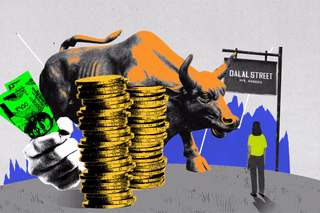
How Crypto ‘Bro’ Culture Around Finance Is the New Toxic Masculinity
“I had this instance where one of my friends offered to pay in crypto for my artwork… they automatically assumed it’s because I don’t get it and not because I have valid concerns.”

This may be a familiar scene to some: at social gatherings, when people begin to circle off into smaller groups, words like “crypto,” “invest,” “stocks,” “portfolio” begin buzzing through the air, like hummingbirds carrying the specks from circle to circle.
All of a sudden, you are cowed. The sense of being an outsider is an invisible disempowerment that comes with not having access to the vocabulary or the confidence to talk about the most powerful thing in the world: money.
It has less to do with knowledge itself and more to do with cultural notions of who has legitimate monopoly over money. Within families, this is usually the men, otherwise known as the “Economics Uncles.” Economics Uncles know a lot about the economy, and it is always good or bad, in their estimation – with no further explanation. Today, in the world outside the one inhabited by the uncles, we find ourselves confronted with “finance bros” – people, usually young men, who feel the need to assert their dominance by touting their purported knowledge of the shiny new objects in finance.
“‘You have no idea what you’re doing with your money if you’re not investing in crypto,’ is an actual thing said to me by a finance bro once. This despite the fact that it turned out I had been investing money for way longer than he had — just not “correctly” it would seem,” said A, 23.
This new space in finance, carved out by the crypto boom and NFT outbreak, has one fundamental thing in common with the finance spaces from the Economics Uncles Era: They are exclusionary and often primarily towards women.
Economist and author Shrayana Bhattacharya points out that despite the fact that some of the most prominent people in banking and finance are now women, the everyday cultural conversations around finance remain excessively clique-y, bro-y, and insider-y.
It has to do with the fact that money is power, is masculinity, and the very many tools and instruments concocted to deal in it are undeniably inaccessible for those who aren’t traditionally considered proprietors of money. More women understand the economy now and are financially literate in the basic sense. But with the rise in speculative finance like cryptocurrency, there is now an inescapable continuum of “economics uncles” to “finance bros,” forming a vortex that swallows up any meaningful conversation or genuine questions about either economics or finance.
Related on The Swaddle:
From Cat Memes to LeBron James’s Dunks, NFT Art Is Selling At Record Prices. But What Is It?
“Women’s involvement in areas of money and markets is limited in our country. Now, when you have a new market, it will almost by design – because of the nature of what women’s roles are in society – get transmitted into other kinds of conversations,” Bhattacharya tells me.
This makes the continuum apparent: most people having conversations about investing in new financial instruments like crypto are privileged, cis-het men in IT, startups, or even, as Akira, 27, puts it, “unemployed people with the requisite IT education.” Money games and aggressive masculinity are bedfellows – anyone who wants to get in has to first get with the requisite attitude. The criteria for belonging is amorphous and nobody explicitly admits it is a boys’ club. But it is a club for those who are enthralled by the prospect of risk-taking; by extension, it is only the most socially, financially comfortable who can afford to take risks. The broad-sweep profiles of the bros in question indicate that they are (usually) men with security already.
Speculative financial tech, then, is not for those who have bills to pay, who don’t have a blue-chip company job or assets, who don’t have the wherewithal to learn about the “what next” when it comes to money because they’re still caught up with the “what now?” In other words, it is expensive, in more ways than one, to invest in risk-intensive schemes – developed, in the first place, in a hypermasculine context.
***
Briti, 24, describes conversations with peers who share the same designation as her. She is the perfect candidate to discuss finance on paper. There is nothing to differentiate her credentials (prestige college grad, strategic projects manager at a blue-chip company) from those of the bros waxing eloquent about crypto. And yet, she describes finance as a “huge black box.”This hesitation is gendered and is an invisible undercurrent in conversations. Crypto, NFT, and other new financial instruments represent a new dimension to the problem. It boils down to the fact that speculative finance is gamified to make participants feel hooked and electrified. The rewards promised are huge, making the losses seem like a risk worth taking. But in a culture where financial independence itself is often a hard-won battle for women even today, speculative finance games feel like an unnecessary extravagance that they can’t afford.
“Many women [I know] do not consider stocks safe and do not look for it as a source of investment,” says Alisha. Women “are brought up to think about the stability of family from childhood itself… So rather than risking and failing it would be considered better to have stability,” she adds. Research also shows that women are more risk and loss averse than men when it comes to financial decision-making. The gendered expectations around investment also mean that while for men, it is an exciting, self-fulfilling prospect, for women, investment continues to be largely oriented towards the family as a whole.
Related on The Swaddle:
A Dictionary Picked ‘NFT’ as 2021’s Word of the Year
The gendered assumptions embedded into who can afford to take risks, however, is only the first in a long chain link of factors – it also has to do with masculinity, the “crisis of confidence,” and the idea of the expert itself.
The problem is, increasingly, expertise is viewed in terms of personal experience – and overwhelmingly, purveyors of money and finance are men. An inescapable cycle thus persists where, by being left out of conversations about money, women are left out of experience, and thus expertise. It’s why, despite there being greater numbers of women in powerful finance positions and generating knowledge about it, there doesn’t seem to be a corresponding dent in how finance is perceived.
There is also a frat-party atmosphere to the advertising around speculative finance that cements the hypermasculinity and even sexism: underwear-clad models covered in Bitcoin logos and women being propositioned during job interviews. In one ad, a currency called DateCoin features “a reclining woman in a swimsuit with text over her body that read[s], ‘Touch my I.C.O,’” the New York Times noted.
For cis-het men, on their part, finance becomes a new way of asserting their masculinity amid greater scrutiny on their social behaviour. There is a very specific energy to the shapers of finance culture: a frenetic coked up energy of Wall Street is the aspirational vibe – the dominance, aggression, control, and fearlessness are seductive. There is a resurgent masculinity today that has arisen almost as a way to compensate for the ways masculinity is threatened now by more women in positions of financial stability and independence. Jargonized conversations about money become a way to build yet another wall that keeps some more aspects of money firmly enclosed within a boys’ club.
Many men, too, feel left out and emasculated as a result.
“I am a man and even I feel intimidated often about it being a very closed boys club,” says Saurabh. “It’s exhausting to me personally because the tone of the argument is always get-rich quick schemes and you can really feel left out,” Akshay, 25, adds.
***
There is intense disagreement on whether stocks and crypto are, in their very essence, easy to understand or not. For some, they’re simple concepts couched in incredibly dense language. For others, this dense language signals the impossibility of understanding them. “Speculative financial technologies like these derive a lot of their cultural power from being hard to define. Clear definition is usually a sign that an instrument is well regulated,” writes Tressie McMillan Cottom, for The New York Times.
The vocabulary is thus the keys to the kingdom. For women, the fact that it is difficult to understand is not for a lack of trying to get it, but because it is inaccessible by default – making it an insider code-speak that excludes anyone whose relationship with money was less than secure to begin with. “Anytime technologies of language which complicate participation – budgets, science, markets – [emerge], it becomes problematic because it impacts us in the long run. The stock market may help women with their savings, but [often] you’re not socialized to manage money…” Bhattacharya says.
But the skepticism that women have isn’t to be underestimated. There is a gut sense among many that it is possible to live without engaging with new financial markets – and sometimes, there is merit to the concern.“I had this instance where one of my friends offered to pay in crypto for my artwork… When I refused, they automatically assumed it’s because I don’t get it and not because I have valid concerns,” says Aparna, 22.
“This person, who is a man, ended up losing a lot of money in the end.”
Finance culture, then, can tell us something about gender relations in the post-liberalization landscape today – they appear to have been repaired with greater financial mobility, but manufactured financial exclusion becomes an added layer of disempowerment that has arrived on the scene to try and neutralize these gains.
The libertarian ideology – or the idea of free exchanges sans government interference – behind technologies like cryptocurrency or even stocks, makes them seem like an egalitarian thing to access. But the gendered element around the idea of risk-taking and money that precludes any talk about them without really understanding it. As a result, we have school boys who invest in stocks and make it big, while grown women shy away from it as something that’s “too complicated.”
Finance capitalism, then, only looks like it promises equal opportunity in the game. But it is hard to critique not only the access to opportunity it affords, but to also question the rules of the game itself, without speaking in the language of power. This language circulates informally, a perverse inverse of the whisper network that so often saves marginalized people from harm – here, the whispers are passed along only to those who are in on it.
Rohitha Naraharisetty is a Senior Associate Editor at The Swaddle. She writes about the intersection of gender, caste, social movements, and pop culture. She can be found on Instagram at @rohitha_97 or on Twitter at @romimacaronii.
Related


How Gene‑Editing Technology Can Offer a Potential HIV Cure
